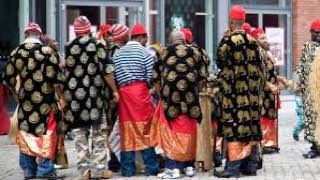Traveling is not just about visiting new places and ticking off landmarks on a checklist; it’s about immersing ourselves in the rich tapestry of different cultures that make our world so diverse and fascinating.
The Igbo people, known for their rich cultural heritage, have a deep sense of identity and a strong connection to their roots. Through travel, Igbos have the incredible opportunity to explore, celebrate, and strengthen their cultural ties.
When Igbos embark on journeys to different parts of Nigeria or even beyond its borders, they carry with them the essence of their culture. Travel becomes a means to showcase and share Igbo traditions, customs, and values with people from diverse backgrounds. It’s a chance to proudly display the unique aspects of Igbo culture, such as the vibrant attire, the captivating music and dance forms, and the delicious cuisine that tantalizes the taste buds.
 When we travel, we have the incredible opportunity to step outside our comfort zones and engage with people from different backgrounds, traditions, and beliefs. It’s through these interactions that we can gain a deeper understanding and appreciation for the diverse cultures that exist across the globe. Whether it’s savoring traditional cuisine, participating in local festivals, or simply engaging in conversations with the locals, every encounter becomes a window into a new world.
When we travel, we have the incredible opportunity to step outside our comfort zones and engage with people from different backgrounds, traditions, and beliefs. It’s through these interactions that we can gain a deeper understanding and appreciation for the diverse cultures that exist across the globe. Whether it’s savoring traditional cuisine, participating in local festivals, or simply engaging in conversations with the locals, every encounter becomes a window into a new world.
One of the most beautiful aspects of cultural connections through travel is the way it broadens our horizons and challenges our preconceived notions. It allows us to break free from stereotypes and truly see the world through a different lens. As we immerse ourselves in new cultures, we learn to embrace and celebrate our differences, fostering a sense of unity and empathy.
One of the most significant ways Igbos connect culturally through travel is by participating in cultural festivals and events. These gatherings provide a platform for Igbos to come together, celebrate their shared heritage, and pass down traditions to younger generations. From the Igbo New Yam Festival (Iri Ji) to the Mmanwu Festival, these events showcase the richness of Igbo culture, fostering a sense of unity and pride.
Travel also allows Igbos to explore their ancestral roots and reconnect with their lineage. Many Igbos have a deep desire to visit their ancestral villages, where they can learn about their family history, meet distant relatives, and gain a deeper understanding of their heritage. This pilgrimage to their ancestral lands serves as a powerful way to strengthen their cultural identity and foster a sense of belonging.

Furthermore, travel offers Igbos the chance to engage with other cultures and create meaningful connections. As they interact with people from different backgrounds, Igbos have the opportunity to learn from and appreciate the customs and traditions of other communities. This exchange of ideas and experiences not only broadens their perspective but also strengthens cultural bonds and promotes mutual respect.
Through travel, Igbos can also contribute to the preservation and promotion of their culture. By visiting historical sites, museums, and cultural centers, they support the preservation of Igbo artifacts, traditions, and stories. Additionally, Igbos can showcase their artistic talents and entrepreneurial spirit by sharing their crafts, artwork, and traditional practices with a wider audience.
Moreover, cultural connections through travel enable us to become ambassadors of understanding and respect. By sharing our experiences and stories with others, we can break down barriers and bridge the gaps between cultures. We become catalysts for change, promoting tolerance, acceptance, and appreciation for the beauty that lies in our differences.
So, let’s embrace the transformative power of travel as Ndi igbo. Let’s embrace the opportunity to share our vibrant heritage, celebrate our traditions, and create lasting connections with people from diverse backgrounds.
It’s a journey of self-discovery, unity, and appreciation for the beauty of cultural diversity and immersion.




